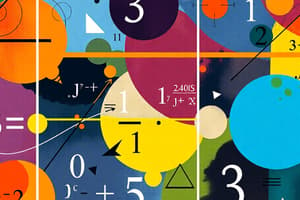Podcast
Questions and Answers
What is the primary focus of calculus?
What is the primary focus of calculus?
- Properties of geometric figures
- Change and motion (correct)
- Measures of central tendency
- Basic operations of numbers
Which of the following branches of mathematics specifically deals with shapes and sizes?
Which of the following branches of mathematics specifically deals with shapes and sizes?
- Statistics
- Calculus
- Algebra
- Geometry (correct)
What type of numbers does arithmetic NOT typically include?
What type of numbers does arithmetic NOT typically include?
- Complex numbers
- Prime numbers
- Imaginary numbers (correct)
- Natural numbers
In algebra, what is utilized to represent unknown quantities?
In algebra, what is utilized to represent unknown quantities?
Which of the following terms is associated with statistics?
Which of the following terms is associated with statistics?
What mathematical concept involves limits and infinite series?
What mathematical concept involves limits and infinite series?
Which of the following equations is NOT a type related to algebra?
Which of the following equations is NOT a type related to algebra?
What does descriptive statistics primarily do?
What does descriptive statistics primarily do?
Flashcards
Arithmetic
Arithmetic
Arithmetic involves basic math operations like addition, subtraction, multiplication, and division. It's the foundation for more advanced math concepts.
Algebra
Algebra
Algebra uses symbols and variables to represent numbers and relationships, extending arithmetic to solve problems with unknowns.
Geometry
Geometry
Geometry studies shapes, sizes, and positions of figures in space. It deals with points, lines, angles, and more.
Calculus
Calculus
Signup and view all the flashcards
Statistics
Statistics
Signup and view all the flashcards
Prime Numbers
Prime Numbers
Signup and view all the flashcards
Functions
Functions
Signup and view all the flashcards
Branches of Mathematics
Branches of Mathematics
Signup and view all the flashcards
Study Notes
Introduction to Mathematics
-
Mathematics is a fundamental science focused on logic, quantity, structure, space, and change.
-
It encompasses a wide range of concepts and tools used to model and solve problems in various disciplines.
-
Different branches of mathematics include arithmetic, algebra, geometry, calculus, and statistics.
Arithmetic
-
Arithmetic deals with basic operations like addition, subtraction, multiplication, and division.
-
It forms the foundation for more advanced mathematical concepts.
-
Includes properties of numbers (e.g., commutative, associative, distributive).
-
Covers different number systems (e.g., natural numbers, integers, rational numbers, irrational numbers, real numbers, imaginary numbers, complex numbers).
-
Introduces crucial concepts like prime numbers, factors, multiples, and divisibility rules.
Algebra
-
Algebra uses symbols and variables to represent numbers and relationships.
-
It extends arithmetic by introducing unknowns and equations.
-
Essential for solving various problems involving unknown quantities.
-
Features different types of equations (linear, quadratic, polynomial, etc.).
-
Includes operations with polynomials, factoring, and solving equations.
-
Deals with functions and their properties.
Geometry
-
Geometry focuses on shapes, sizes, and positions of figures.
-
Covers various geometric figures (e.g., points, lines, angles, triangles, quadrilaterals, circles, polygons).
-
Explores concepts like congruence, similarity, and transformations in space.
-
Studies different geometric spaces (e.g., plane geometry, solid geometry).
-
Applies geometric principles to solve practical problems in various fields.
Calculus
-
Calculus involves the study of change and motion.
-
Includes differential calculus (rates of change) and integral calculus (accumulation of quantities).
-
Essential for modeling and analyzing dynamic systems.
-
Introduces concepts of derivatives, integrals, limits, and infinite series.
Statistics
-
Statistics deals with collecting, analyzing, and interpreting data.
-
Key methods include descriptive statistics (summarizing data) and inferential statistics (drawing conclusions).
-
Includes measures of central tendency (mean, median, mode) and dispersion (variance, standard deviation).
-
Often uses graphical representation of data (e.g., histograms, bar charts, scatter plots).
-
Fundamentals for data analysis in various fields.
Other Branches
-
Other branches of mathematics include number theory, discrete mathematics, graph theory, linear algebra, and topology.
-
These specialized areas often build upon the foundational concepts of arithmetic, algebra, geometry, and calculus.
-
Each area has its own unique applications and methodologies.
Studying That Suits You
Use AI to generate personalized quizzes and flashcards to suit your learning preferences.





